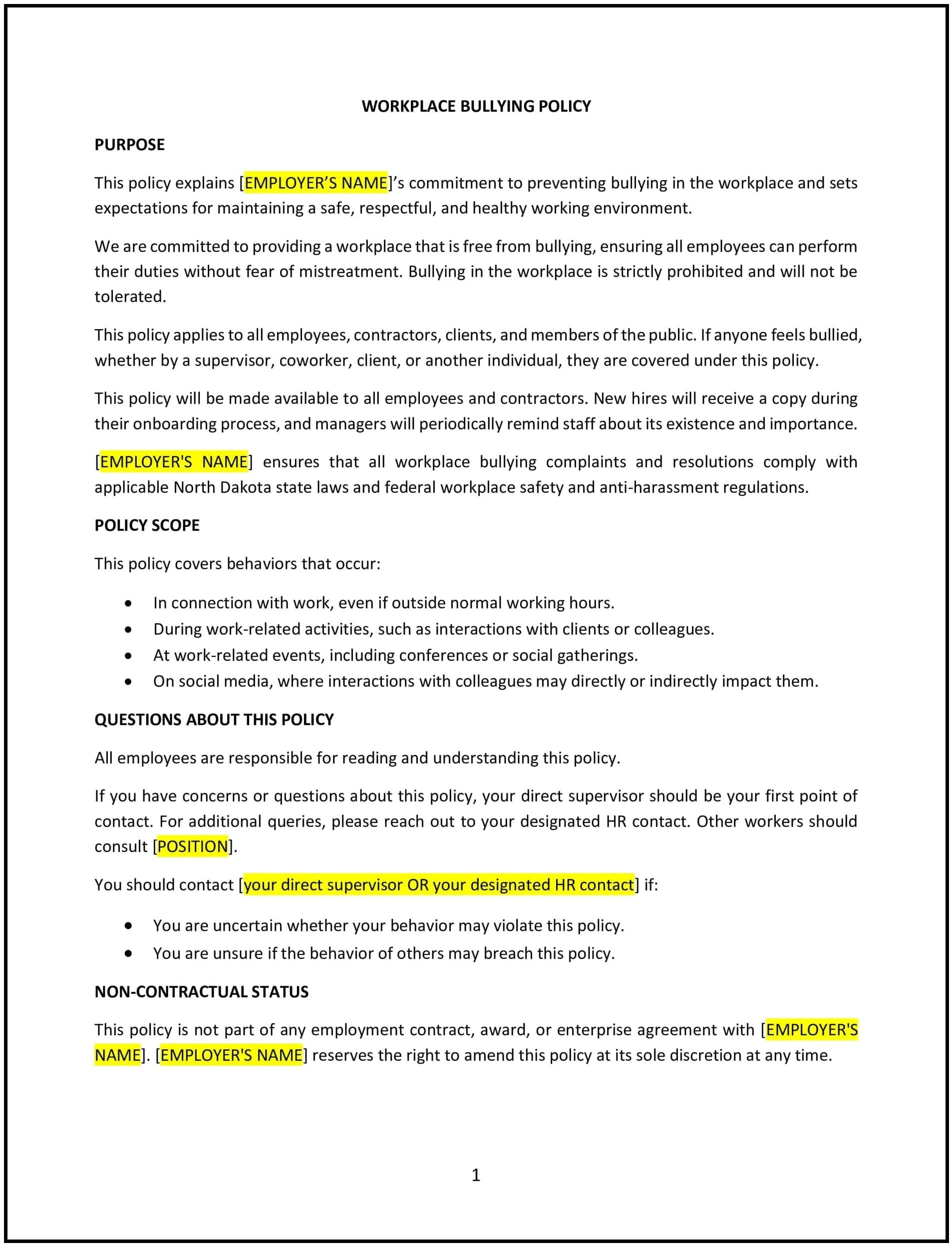Workplace bullying policy (North Dakota): Free template
Got contracts to review? While you're here for policies, let Cobrief make contract review effortless—start your free review now.

Customize this template for free
Workplace bullying policy (North Dakota)
A workplace bullying policy helps North Dakota businesses address and prevent bullying behavior in the workplace. This policy establishes the company’s commitment to providing a safe and respectful work environment free from bullying, harassment, and intimidation. It defines bullying behavior, sets reporting and investigation procedures, and outlines the steps the company will take to address any incidents. The goal is to create a positive and professional work culture, promote mutual respect, and ensure that employees can work without fear of mistreatment.
By adopting this policy, businesses in North Dakota can mitigate risks, reduce workplace conflicts, and support a safe and healthy work environment for all employees.
How to use this workplace bullying policy (North Dakota)
- Define workplace bullying: Clearly define what constitutes workplace bullying, including verbal abuse, physical intimidation, threats, spreading rumors, exclusion, or any other behavior that creates an unsafe or hostile work environment.
- Establish reporting procedures: Employees should be informed of how to report bullying incidents. The policy should specify the steps for reporting, whether it is in writing, via an online system, or in person to a supervisor, HR, or designated officer.
- Clarify the investigation process: Outline how the company will investigate reports of bullying, including the steps for gathering information, interviewing involved parties, and resolving the issue. Ensure investigations are handled fairly, confidentially, and in a timely manner.
- Implement corrective actions: Specify the disciplinary actions that may be taken against employees found to be engaging in bullying behavior, which could include counseling, warnings, suspension, or termination depending on the severity.
- Provide support for victims: Offer resources such as counseling or access to employee assistance programs (EAPs) for employees who are victims of bullying. Ensure that employees feel supported and can seek help without fear of retaliation.
- Promote a respectful work culture: Encourage all employees to treat each other with respect and professionalism, creating an environment where bullying is not tolerated. Provide regular training on respectful communication and conflict resolution.
- Review and update: Periodically review and update the policy to ensure it aligns with company goals, North Dakota state laws, and best practices related to workplace bullying.
Benefits of using this workplace bullying policy (North Dakota)
This policy provides several benefits for North Dakota businesses:
- Promotes a respectful work environment: By addressing bullying proactively, businesses can foster a culture of respect, which contributes to higher employee morale and productivity.
- Reduces legal risks: A clear and well-enforced policy helps businesses avoid potential lawsuits related to workplace bullying, harassment, or discrimination.
- Improves employee retention: Employees are more likely to stay with a company that provides a safe and supportive workplace, reducing turnover and recruitment costs.
- Enhances company reputation: Businesses that take workplace bullying seriously are seen as responsible employers, which can improve their reputation in the community and attract top talent.
- Supports employee well-being: Employees who feel safe and respected at work are more likely to be engaged and productive, contributing to the overall success of the business.
Tips for using this workplace bullying policy (North Dakota)
- Communicate the policy clearly: Ensure that all employees understand the workplace bullying policy and the procedures for reporting incidents. Include the policy in the employee handbook and provide training on identifying and addressing bullying behavior.
- Encourage early reporting: Foster a culture where employees feel comfortable reporting bullying incidents early, before they escalate, and ensure that reports are treated seriously and confidentially.
- Provide support to victims: Offer emotional and psychological support to victims of bullying and provide access to resources like counseling or EAPs.
- Monitor the effectiveness of the policy: Regularly review the policy and assess how well it is working by gathering feedback from employees and reviewing incident reports.
- Stay up to date with legal requirements: Ensure that the policy complies with North Dakota state laws and relevant federal regulations regarding harassment, discrimination, and workplace safety.